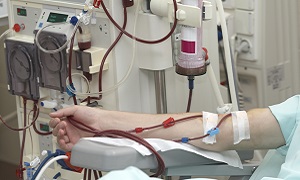Acute Kidney Failure
Acute kidney failure, also known as acute renal failure (ARF) or acute kidney injury (AKI), is a sudden and rapid decline in kidney function, leading to the accumulation of waste products and fluids in the body. This condition can arise over hours to days and can significantly disrupt bodily functions. Recognizing and understanding the causes, symptoms, diagnosis, and management of acute kidney failure is crucial for effective treatment and recovery.
The kidneys are vital organs located on either side of the spine, just below the ribcage. Their primary functions include:
- Filtering Blood: Removing waste products and excess fluids from the blood to form urine.
- Regulating Electrolytes: Maintaining the balance of electrolytes such as sodium, potassium, and calcium.
- Acid-Base Balance: Regulating the pH of the blood by excreting hydrogen ions and bicarbonate.
- Blood Pressure Regulation: Producing renin, which helps regulate blood pressure.
- Erythropoiesis: Stimulating the production of red blood cells through the release of erythropoietin.
Symptoms of Acute Kidney Failure
Symptoms of acute kidney failure can vary depending on the underlying cause and the severity of the condition. Common symptoms include:
- Decreased Urine Output: Noticeable reduction in the volume of urine produced, or in some cases, complete cessation of urine output.
- Fluid Retention: Swelling of the legs, ankles, and face due to fluid accumulation.
- Fatigue and Weakness: Generalized weakness, tiredness, and reduced energy levels.
- Nausea and Vomiting: Accumulation of waste products leading to gastrointestinal symptoms.
- Confusion: Changes in mental status or alertness due to electrolyte imbalances and toxins.
- Shortness of Breath: Pulmonary edema (fluid accumulation in the lungs) may occur.
- Severe Pain: Pain in the lower back or flank region, depending on the underlying cause.
Causes of Acute Kidney Failure
Acute kidney failure can be classified into three main categories based on the underlying cause:
-
Prerenal Failure: Caused by factors that reduce blood flow to the kidneys, leading to decreased glomerular filtration rate (GFR). Common causes include:
- Hypovolemia: Severe dehydration, blood loss, or fluid loss due to conditions like vomiting, diarrhea, or burns.
- Reduced Cardiac Output: Conditions like heart failure or shock that impair the heart’s ability to pump blood effectively.
- Renal Artery Stenosis: Narrowing of the arteries supplying blood to the kidneys.
-
Intrinsic Renal Failure: Results from direct damage to the kidney tissues, particularly the glomeruli, tubules, or interstitium. Causes include:
- Acute Tubular Necrosis (ATN): Often caused by ischemia (lack of blood flow) or nephrotoxic agents (e.g., certain medications, contrast dyes, or toxins).
- Glomerulonephritis: Inflammation of the glomeruli due to infections, autoimmune diseases, or systemic conditions.
- Acute Interstitial Nephritis: Inflammation of the kidney’s interstitial tissue, commonly due to allergic reactions to medications or infections.
-
Postrenal Failure: Occurs when obstruction of urine flow leads to increased pressure in the renal collecting system. Causes include:
- Urinary Tract Obstruction: Kidney stones, tumors, or enlarged prostate obstructing urine flow.
- Bladder Outlet Obstruction: Conditions such as severe bladder dysfunction or external compression of the bladder.
Diagnosis
If your signs and symptoms are suggesting that you might have acute kidney failure, then your doctor might recommend certain tests and procedures in order to verify the diagnosis. These can include the following:
Urine output measurements
Blood tests
Urine tests
Imaging tests
Removing a sample of kidney tissue for testing

Treatment
Your treatment is going to depend on what your cause of acute kidney failure is. The goal of the treatment is to always restore the normal function of the kidneys. It is also important to prevent fluids and wastes from building up, during the recovery of the kidneys. In most cases, the evaluation is made by a kidney specialist known as a nephrologist.
Diet
Medications
Dialysis
Complications of Acute Kidney Failure
Acute kidney failure can lead to several serious complications, including:
- Chronic Kidney Disease: Prolonged or severe acute kidney injury can lead to long-term kidney damage and chronic kidney disease.
- Fluid Overload: Can lead to pulmonary edema and heart failure.
- Electrolyte Imbalances: May result in cardiac arrhythmias or neuromuscular dysfunction.
- Infections: Increased susceptibility to infections due to impaired kidney function and possible use of invasive devices.
Prevention of Acute Kidney Failure
Though it is generally hard to predict or prevent, taking a few steps can reduce your risk of developing acute kidney failure.
If you have kidney disease or any other condition, which can increase the risk of acute kidney failures, such as diabetes or high blood pressure, then follow your doctor’s recommendations to manage your condition.
Make a healthy lifestyle a priority. Make sure that you are active, and eat a sensible and balanced diet. If you drink alcohol, do it in moderation.







